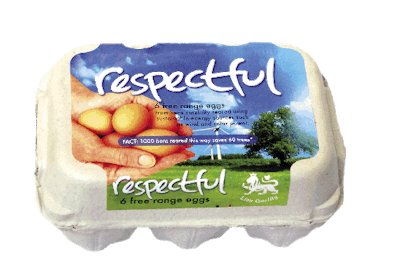
Concerns about the environment have rapidly risen to the top of the priority list of many of the world's most powerful politicians, and so called ‘green' issues are becoming the focus of communities at every level. There is plenty of debate and disagreement over many of the important issues like global warming and what to do about it. Whichever side proves to be right, there is little doubt that changes will come to all our lives as a result of real or perceived environmental effects.
Some countries are already noticing changes in consumer habits. One supermarket in the United Kingdom has reported a 1400% increase in sales of clothes pegs. Apparently, consumers are abandoning their tumble dryers in droves in favour of hanging their clean washing on lines in the air to dry a good example of the concept ‘back to the future'.
Catching this mood of the moment is leading UK egg producer, Stonegate. In June, the company launched its Respectful brand of eggs with supermarket chain ASDA. It is claimed that this makes ASDA owned by US giant, Wal-Mart the first supermarket in the world to offer eggs with a reduced carbon footprint. This is a particularly interesting development as ASDA has the reputation for keeping retail prices low. Indeed, it has been awarded Britain's lowest priced supermarket award by The Grocer magazine for 10 successive years.
Producing eggs with a reduced carbon footprint
Respectful eggs are produced by Stonegate in Lincolnshire in eastern England.
The hens are kept in flocks of no more than 4000 under free-range conditions with access to large grass ranges. The houses are mobile, so that the range area can be rotated.
The eggs are produced by hens fed locally sourced grain to reduce the carbon footprint, it is said. Interestingly, the feed is not organic. The company explains, "We estimate that 40% of organic hen feed in the UK is imported. The sourcing of our free-range feed locally is in line with our commitment to reduce the carbon footprint of Respectful eggs."
Among the other special features of the farms is that they are powered by carbon-neutral, renewable energy sources such as wind turbines and solar panels. It is explained that these methods reduce the amount of damaging carbon dioxide released into the atmosphere and help to prevent the acceleration of global warming and climate change. Although undoubtedly catching the mood of the moment, consumers may be unaware that free-range production systems usually require minimal power input in any case.
Like the majority of eggs produced in the country, Respectful eggs meet the standards required by the Lion Egg Quality scheme. The Lion symbol is used on all eggs and packs produced to these standards, which include vaccination against salmonella.
Commenting on why it is investing in the special egg brand, Richard Kempsey, Respectful Farm Liaison Officer for Stonegate explained, "Stonegate is investing in the future of sustainable energy in British farming. We are working in partnership with farms to help them invest in sustainable power sources such as wind and solar (rather than fossil fuels) to produce Respectful eggs. Stonegate works with the farmer to help amortise their initial outlay and to negotiate longer contracts with the buying groups."
In a further measure to gain environmental virtue, the egg boxes are made from recycled pulp paper, and they are recyclable.
Retailing eggs with a reduced carbon footprint
Explaining the supermarket's view, Chris Brown, Head of Ethical and Sustainable Sourcing for ASDA commented, "We are committed to reducing our carbon footprint in terms of both the products we stock and our own operations. ASDA's environmental policies are in line with its parent company's strategy, which includes long-term environmental goals."
Among these goals are Wal-Mart's four-year target to reduce the carbon footprint for all its new stores across the globe by 30%, and a seven-year target to reduce the carbon footprint of its entire chain of 6000 stores by 20%.
The UK supermarket chain has recently unveiled 'Sustainability 360', a company-wide emphasis on taking sustainability beyond reducing the company's direct environmental footprint to engaging ASDA's associates, suppliers, communities and customers.
The selling price for six Respectful eggs of mixed weight is UK£1.05 (around 1.56 or US$2.10), which is in line with an average box of free-range eggs. They are available in all of the company's stores in England and Wales.
Both producer and retailer believe that the demand for these eggs with a low carbon footprint will continue to grow, encouraging more farmers to invest in wind- and solar-powered technology, so that transportation distances between farm and supermarket are reduced.
A special web site has been developed to coincide with the launch of these ‘green' eggs www.respectfuleggs.co.uk. It is worth visiting for hints on how a leading supermarket chain markets eggs to its customers. The daily diary of a Respectful hen is likely to appeal particularly to animal welfare-conscious consumers in the UK.
For further information on the Lion Quality scheme used for eggs in the UK, please refer to the article by Dr Terry Mabbett in the February issue of Poultry International, entitled ‘Some EU egg producers need to take salmonella control more seriously' (www.WATTpoultry.com/PoultryInternational/Article.aspx?id=10068).















